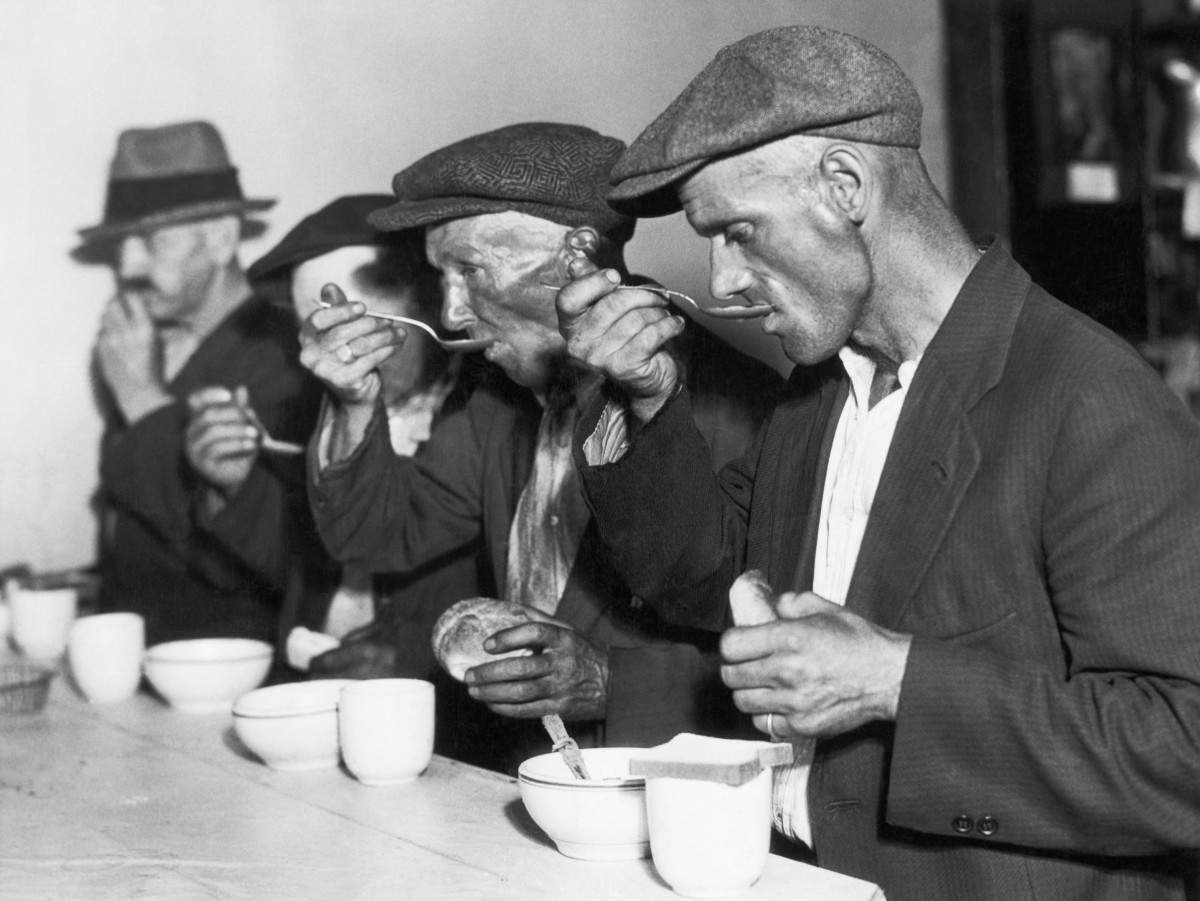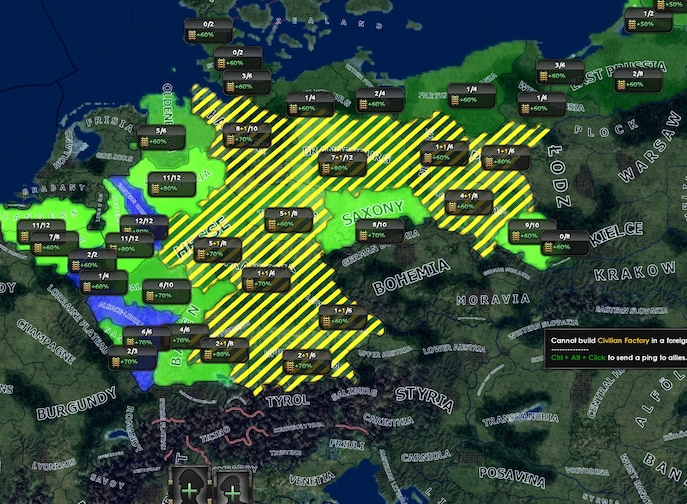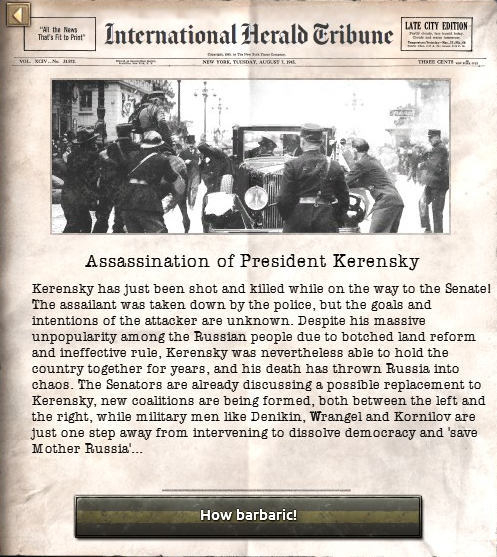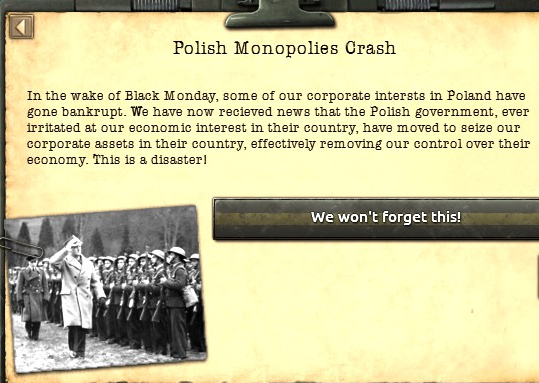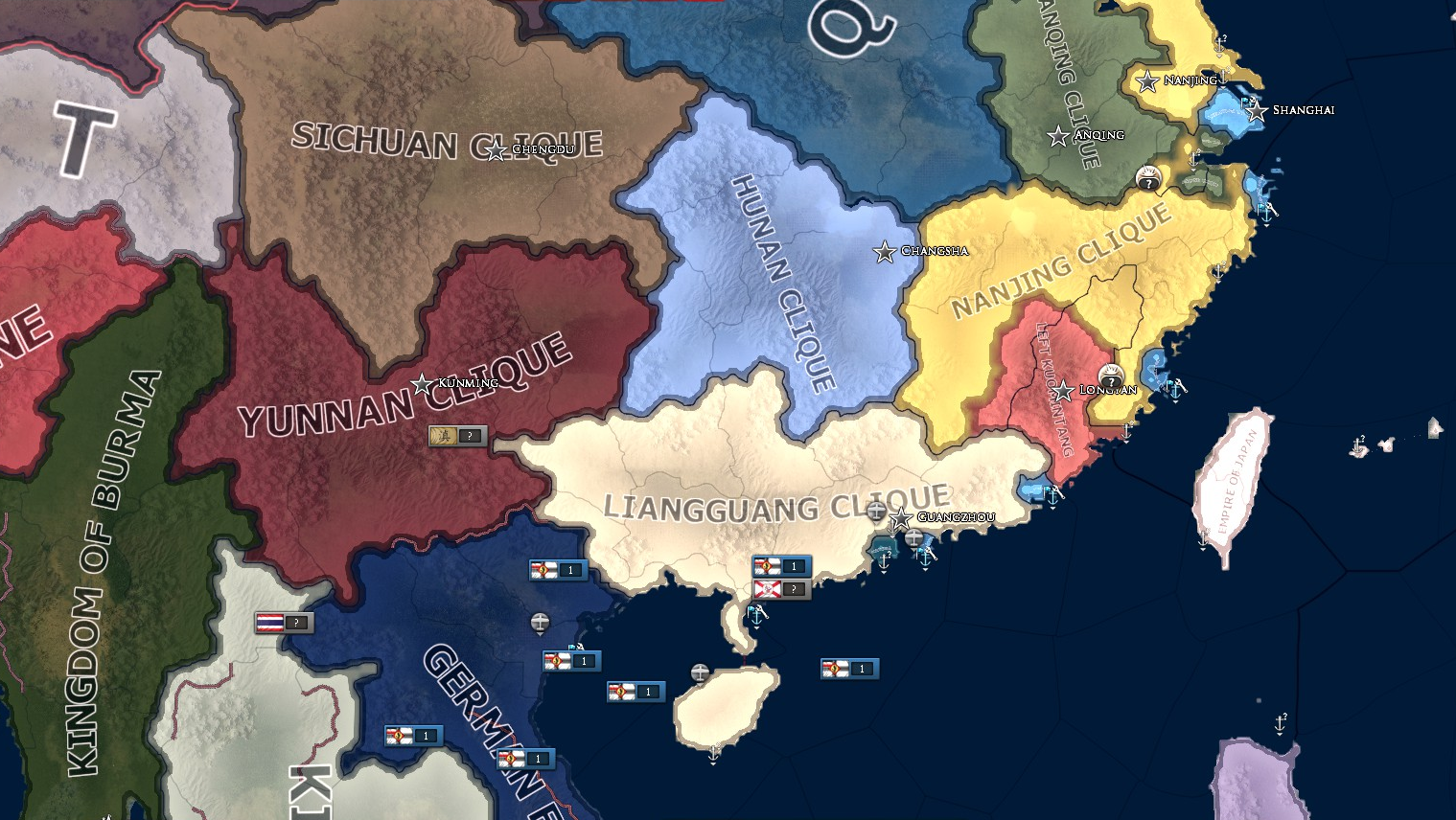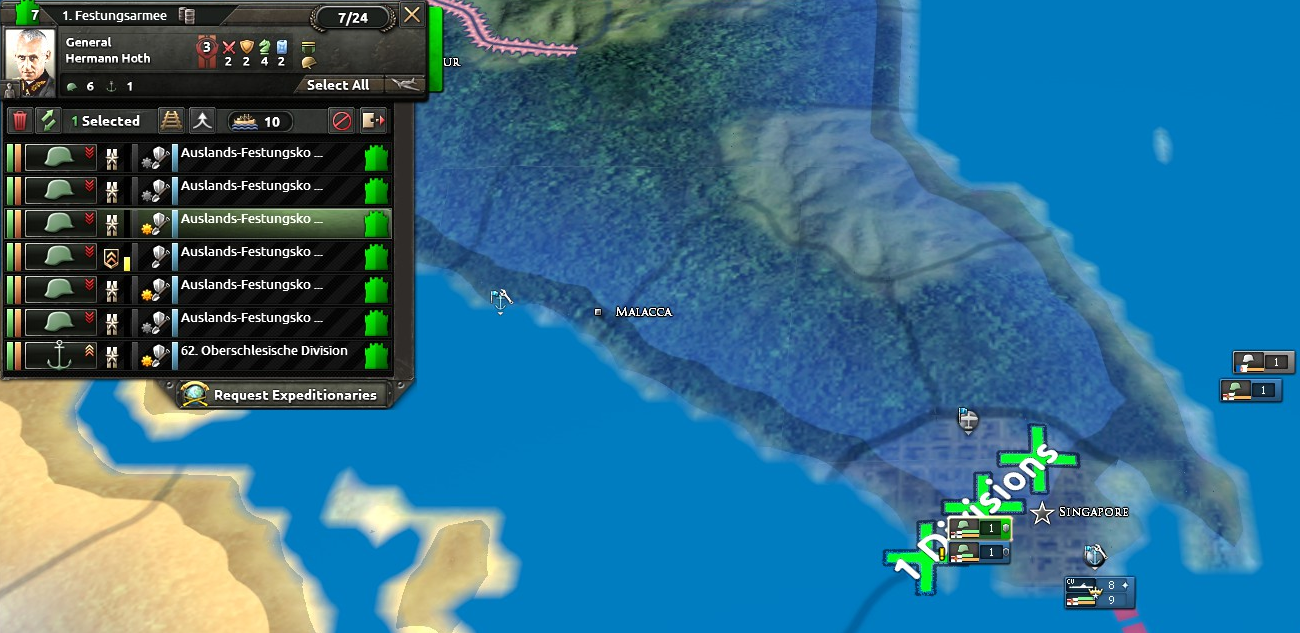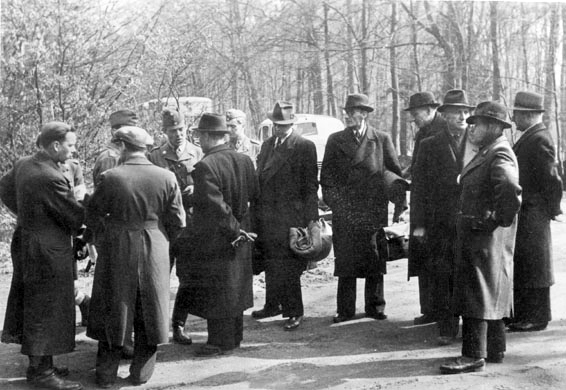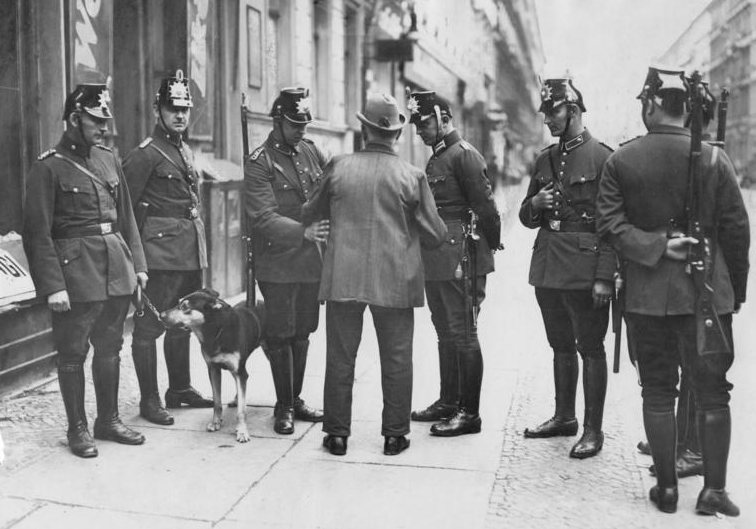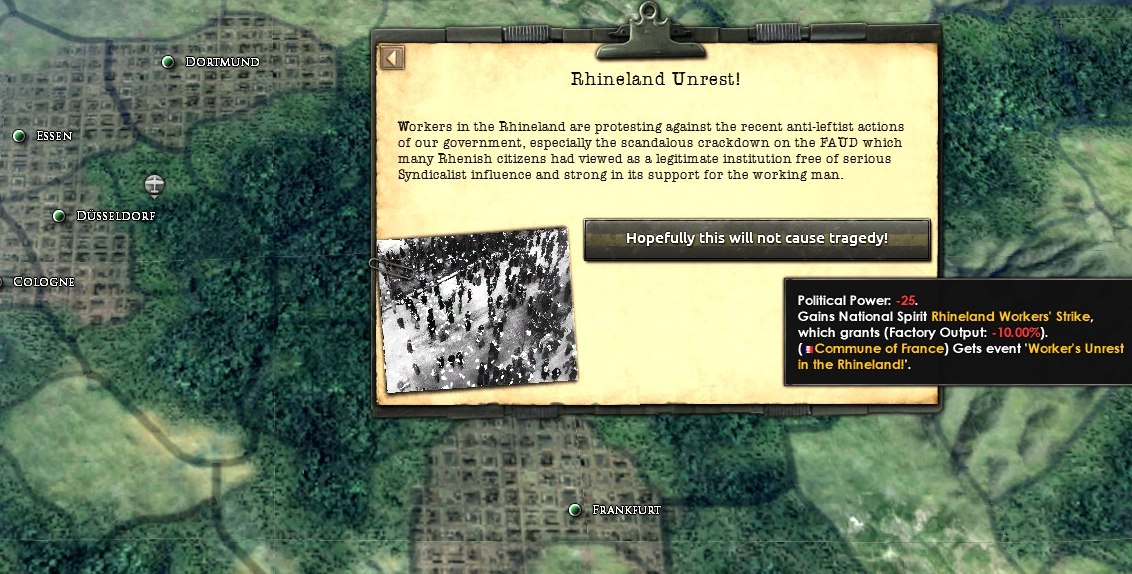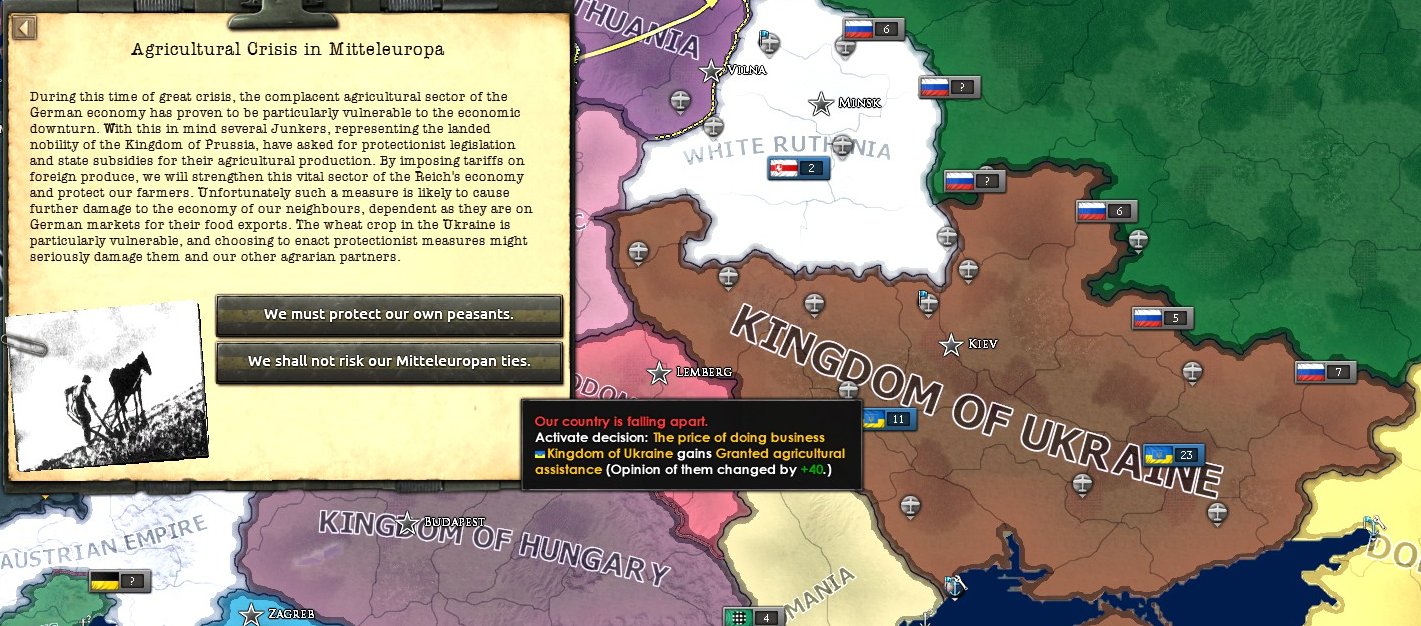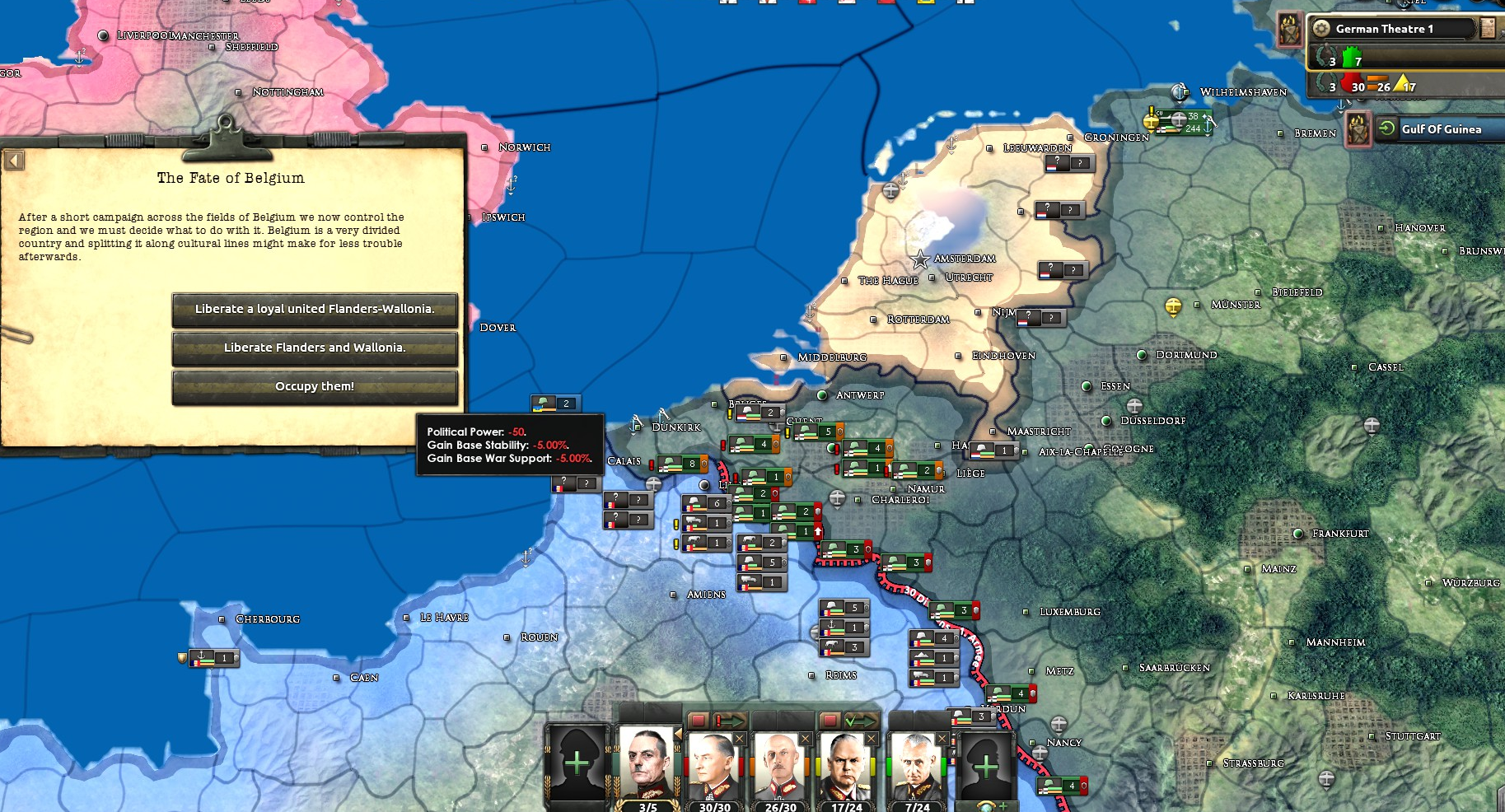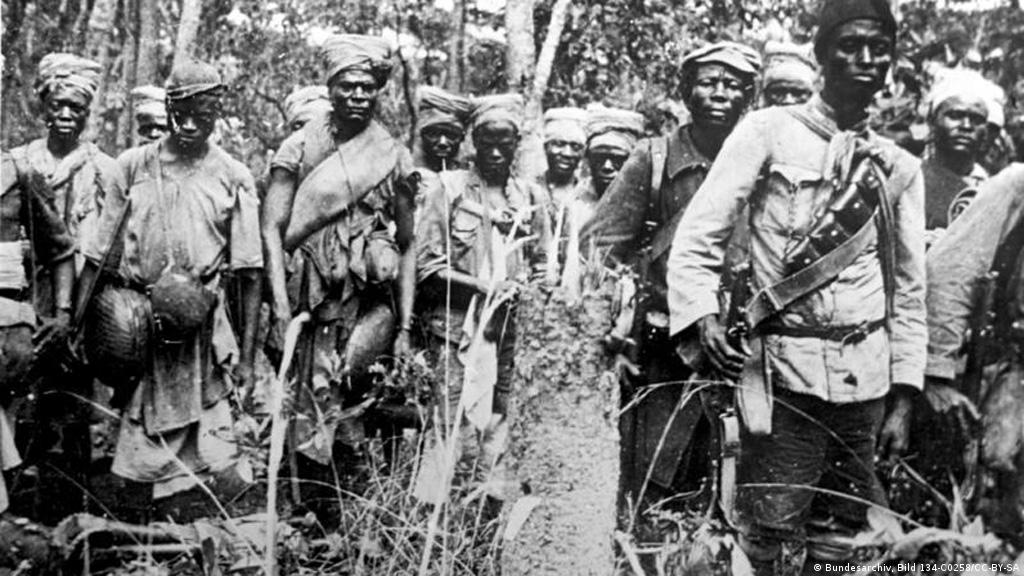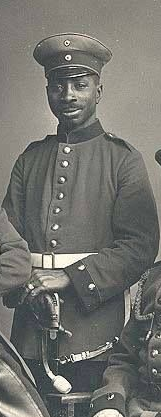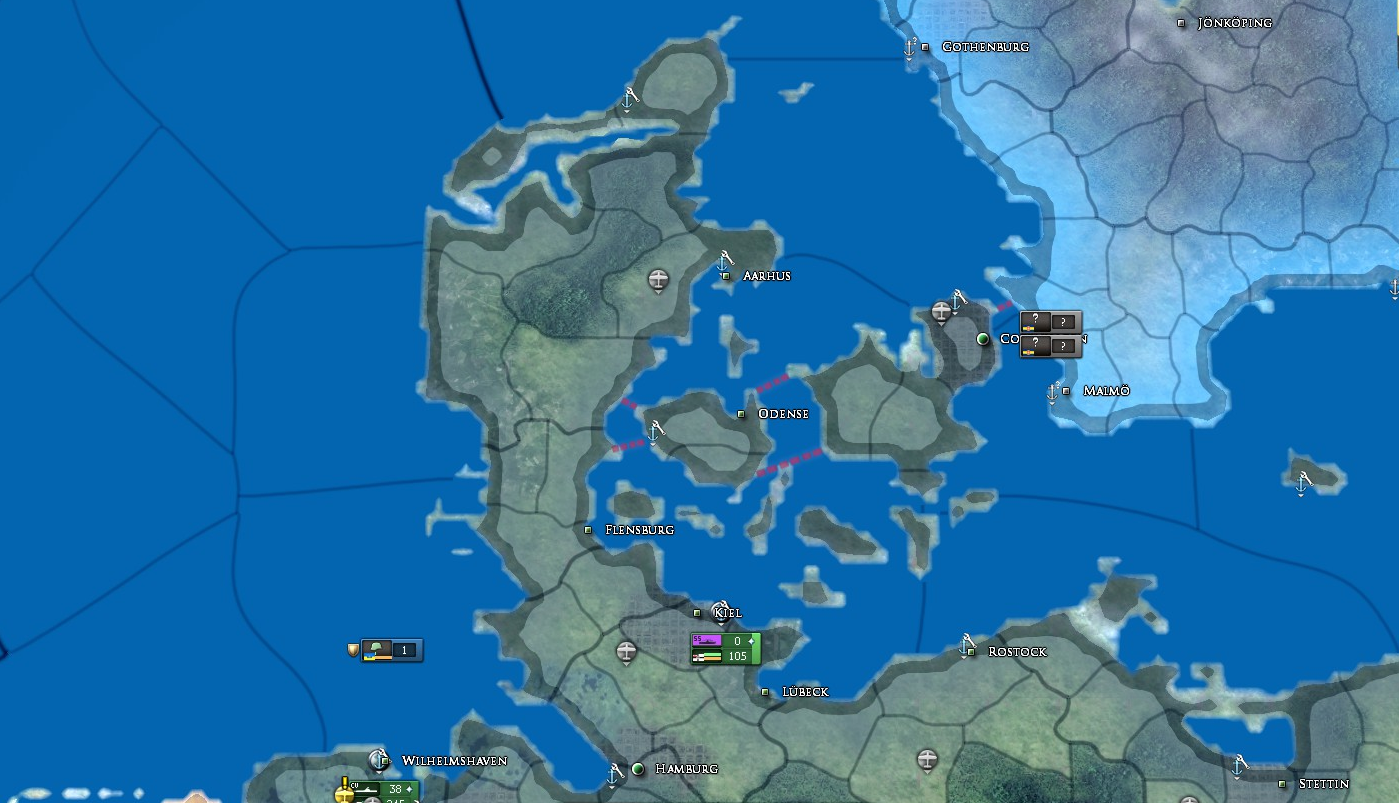#1 - The German Empire in 1936 & the Black Monday Collapse
~~~
This will be a role-play set in the Kaiserreich universe (or at least, heavily inspired by it). The basics of the KR lore remain the same, although I may tweak details here and there for role-playing and story purposes.
Spoiler alert, this is my attempt at creating a realistic narrative surrounding a victorious Germany (in both the 1st and 2nd Weltkriegs), and as such, this AAR shall be heavily focused on Germany.
I'll try to post daily, or every other day.
Please let me know if you're interested in what mods I'm using. Mostly just some light map mods, along with some army/division/air force/navy icon mods (aside from KR, obviously). I use "Player-Led Peace Conferences" and the "State Transfer Tool" for role-playing purposes. ALL expansions are active.
It will be non-interactive. The 'chapters' shall be written from a post-war, pro-German (or at least, not anti-German) historian's perspective.
I hope you enjoy -- this is my very first attempt at an AAR. Please let me know what you think of my writing/narrative, etc. I'm an aspiring amateur author, so any and all critiques are welcome!
P.S. If you're fluent or at least good at writing German, PLEASE let me know how I am at it/correct me when I misuse Google Translate
~~~
This will be a role-play set in the Kaiserreich universe (or at least, heavily inspired by it). The basics of the KR lore remain the same, although I may tweak details here and there for role-playing and story purposes.
Spoiler alert, this is my attempt at creating a realistic narrative surrounding a victorious Germany (in both the 1st and 2nd Weltkriegs), and as such, this AAR shall be heavily focused on Germany.
I'll try to post daily, or every other day.
Please let me know if you're interested in what mods I'm using. Mostly just some light map mods, along with some army/division/air force/navy icon mods (aside from KR, obviously). I use "Player-Led Peace Conferences" and the "State Transfer Tool" for role-playing purposes. ALL expansions are active.
It will be non-interactive. The 'chapters' shall be written from a post-war, pro-German (or at least, not anti-German) historian's perspective.
I hope you enjoy -- this is my very first attempt at an AAR. Please let me know what you think of my writing/narrative, etc. I'm an aspiring amateur author, so any and all critiques are welcome!
P.S. If you're fluent or at least good at writing German, PLEASE let me know how I am at it/correct me when I misuse Google Translate
~~~
The Grand Germanic Empire
A KAISERREICH AAR


The German Empire is stirring once again. Syndicalist radicals, National-populist extremists, and even moderate social liberals clash in the streets. Clamoring for something, anything. The Kaiser, however, is not without his supporters. Indeed, it would appear that, despite the growth of the more radical elements of German society, the Kaiser's conservative supporters have flourished. According to many scholars and pollsters, Kaiser Wilhelm II hadn't enjoyed this level of popularity since the victory of the First Weltkrieg. This was Germany in 1936, the nation that determined the destiny of Europe for decades -- and perhaps even centuries -- to come.
In an (ultimately successful) attempt to show a softer side to the German people, Kaiser Wilhelm II often posed for more casual photos in the latter years of his reign. Here we see him vacationing in the Netherlands, enjoying a cigarette, and -- according to some -- dressed in his favorite suit.
Since the early 1920s, with a victorious Empire at his command, the Kaiser began pressing his advisers for an answer to one question. "What is next for our dear Germany," was put to countless government executives and bureaucrats, generals and admirals; often by the Kaiser himself. Generalfeldmarshall Paul von Hindenburg would say shortly before his death that "The Kaiser wishes to lead Germany to a grand greatness. If only I could tell him the way. To serve my Prince and The Empire one final time..."
Apparently, Hindenburg may have been one of the men that first proffered the "Grand Idea" that the Kaiser would spend the last years of his life chasing. The Kaiser's personal diary shows that the day after Hindenburg's death, Wilhelm II wrote "...with the end upon him, he urged me to pursue not only further German unity, but a Germanic unity."
The Kaiser quickly dedicated himself to the idea of a grand Germanic Empire, an empire that would dominate Europe utterly. All Germanic peoples would be brought under the Kaiser's rule.
Wilhelm II ordered his command staff to begin planning for the invasion and annexation of the Netherlands, Flanders-Wallonia, Switzerland, and eventually... Austria itself. Obviously, such a highly contentious plan would be kept secret, and the Kaiser continued to outwardly call for peaceful relations across the world. However, he knew that the Syndicalist menace would need to strike at the heart of the old world -- Germany -- in order to complete a total Syndicalist revolution. The Kaiser meant to utilize such an "opportunity" to its fullest extent.
~
Berlin, 1936- Since a victorious end to the First Weltkrieg, Germany had dominated Europe, Africa, and even parts of Asia. Power was being centralized in Berlin, all the while foreign nationalists and syndicalists were attempting to tear apart the relatively fragile global-empire that Germany had built.
Apparently, Hindenburg may have been one of the men that first proffered the "Grand Idea" that the Kaiser would spend the last years of his life chasing. The Kaiser's personal diary shows that the day after Hindenburg's death, Wilhelm II wrote "...with the end upon him, he urged me to pursue not only further German unity, but a Germanic unity."
The Kaiser quickly dedicated himself to the idea of a grand Germanic Empire, an empire that would dominate Europe utterly. All Germanic peoples would be brought under the Kaiser's rule.
Wilhelm II ordered his command staff to begin planning for the invasion and annexation of the Netherlands, Flanders-Wallonia, Switzerland, and eventually... Austria itself. Obviously, such a highly contentious plan would be kept secret, and the Kaiser continued to outwardly call for peaceful relations across the world. However, he knew that the Syndicalist menace would need to strike at the heart of the old world -- Germany -- in order to complete a total Syndicalist revolution. The Kaiser meant to utilize such an "opportunity" to its fullest extent.
~
Berlin, 1936- Since a victorious end to the First Weltkrieg, Germany had dominated Europe, Africa, and even parts of Asia. Power was being centralized in Berlin, all the while foreign nationalists and syndicalists were attempting to tear apart the relatively fragile global-empire that Germany had built.

Europe in January 1936
States under direct German control as of 1936:
-The Kingdom of Flanders-Wallonia
-The United Baltic Duchy
-The Kingdom of Lithuania
-The Kingdom of White-Ruthenia/Byelorussia
-The United Baltic Duchy
-The Kingdom of Lithuania
-The Kingdom of White-Ruthenia/Byelorussia
States under indirect German control as of 1936:
-The colonial African super-state of Deutsch–Mittelafrika
-The colonial Asian quasi-naval state of Deutsch-Ostasien (German East Asia)
-The colonial Asian quasi-naval state of Deutsch-Ostasien (German East Asia)
States under German influence as of 1936:
-The Kingdom of Ukraine
-The Kingdom of Finland
-The Kingdom of Finland

The colonial super-state of Mittelafrika along with Germany's other imperial colonies; Madagascar and Djibouti. The latter two, unlike Mittelafrika, are directly administered by the German Empire. As of 1936, the Statthalter (Steward or Governor) of Mittelafrika was Hermann Wilhelm Göring of the Mittelafrikan political party, the Deutsche Vaterlandspartei. While it provided a modest boost in manpower reserves, the primary function of Mittelafrika was to provide The Empire with precious and desperately needed resources. However, many contemporary political commentators and historians pointed out Mittelafrika's fatal flaw; She was simple too large. An attempt to homogenize such an incredibly vast number of culture, languages, and peoples would eventually plunge Mittelafrika into a desperate civil war, eventually leading to dozens of African states.
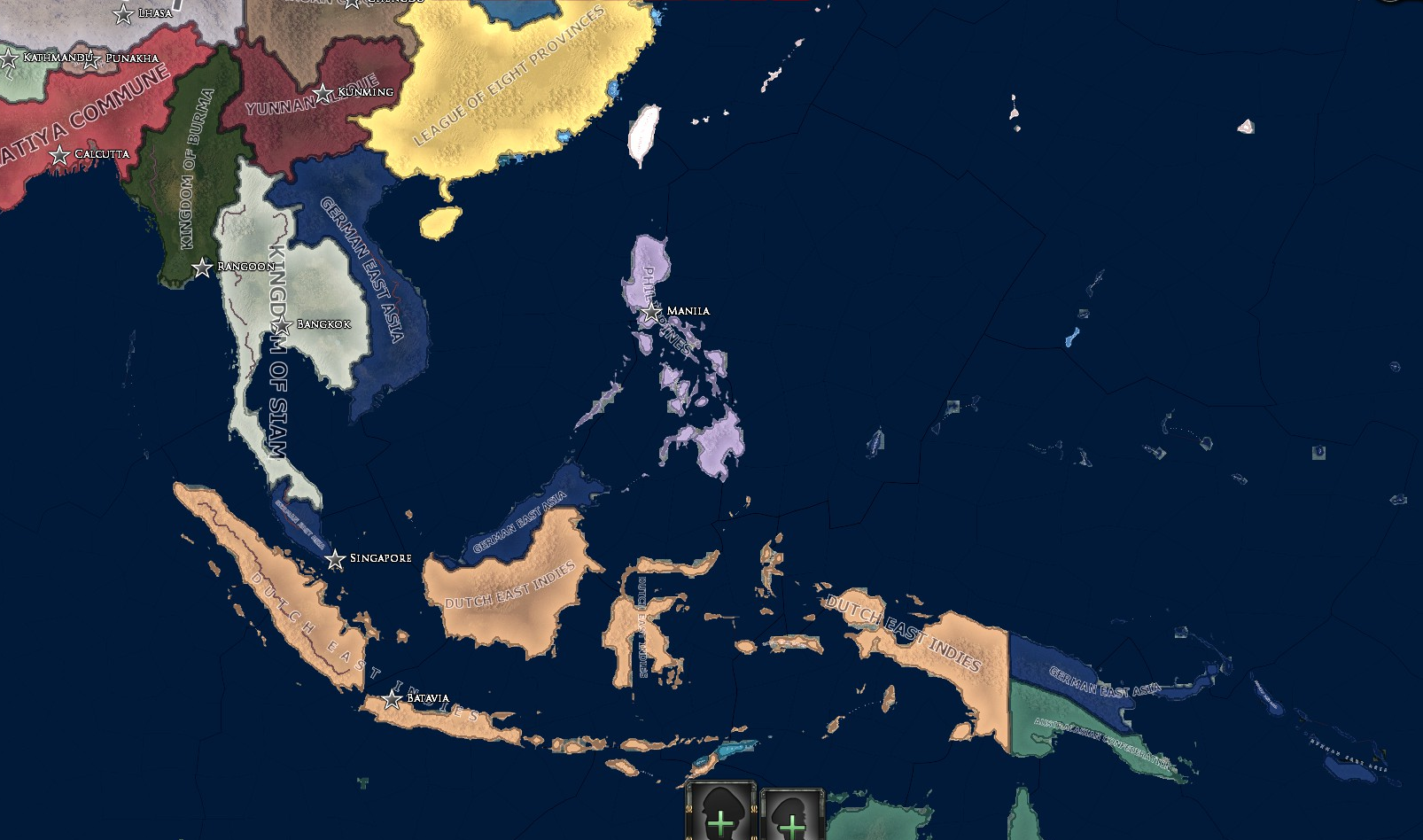
Germany's Asian possessions have been grouped together under a single state, Deutsch-Ostasien. Instead of reporting to the Reichskolonialamt (Imperial Colonial Office) it reports to the Reichsmarineamt (Imperial Naval Office) or RMA. While nominally independent in her day-to-day functions, the state's primary goal is to ensure the continued economic growth of the area for the Empire's sake. With the RMA at the helm, a strong "naval culture" has developed here. Most ground units of the state are designated as and fully trained & capable as Marines. The Navy itself is one of the strongest (or at least, largest) fleets in the region. The Air Force is entirely subordinate to the Deutsch-Ostasien fleet.
German over-confidence in the late 1920s and early 1930s would help lead to one of the greatest finanical catastrophes in history; Schwarzer Montag or "Black Monday." Chasing the dream of a large, stable Empire, the Kaiser authorized virtually uncontrolled spending on both her colonial possessions, her European protectorates, as well as at home.
The Berlin stock exchange just hours before the crash of Black Monday. Note the large top-hats; this article of clothing would later be pilloried in uncountable cartoons and op-eds. Black Monday led to such a hatred of the top-hat wearing German investor around the world that it single-handedly eliminated the fashion.

Hapless officers of the Kaiserliche Berliner Polizei (Imperial Berlin Police; the only police force in Germany to hold the "Imperial" title) attempt to hold back the surging crowds of the German populace, making a run on their banks immediately after the crash of Black Monday.
Black Monday came on 10 February, 1936, and would be utterly devastating to the German economy. All the while, her miraculous recovery would end in a massive net benefit for The Empire. Just how Germany would recover, as well as the events of the late 1930s will be discussed in our next lesson...
Last edited:
- 1


